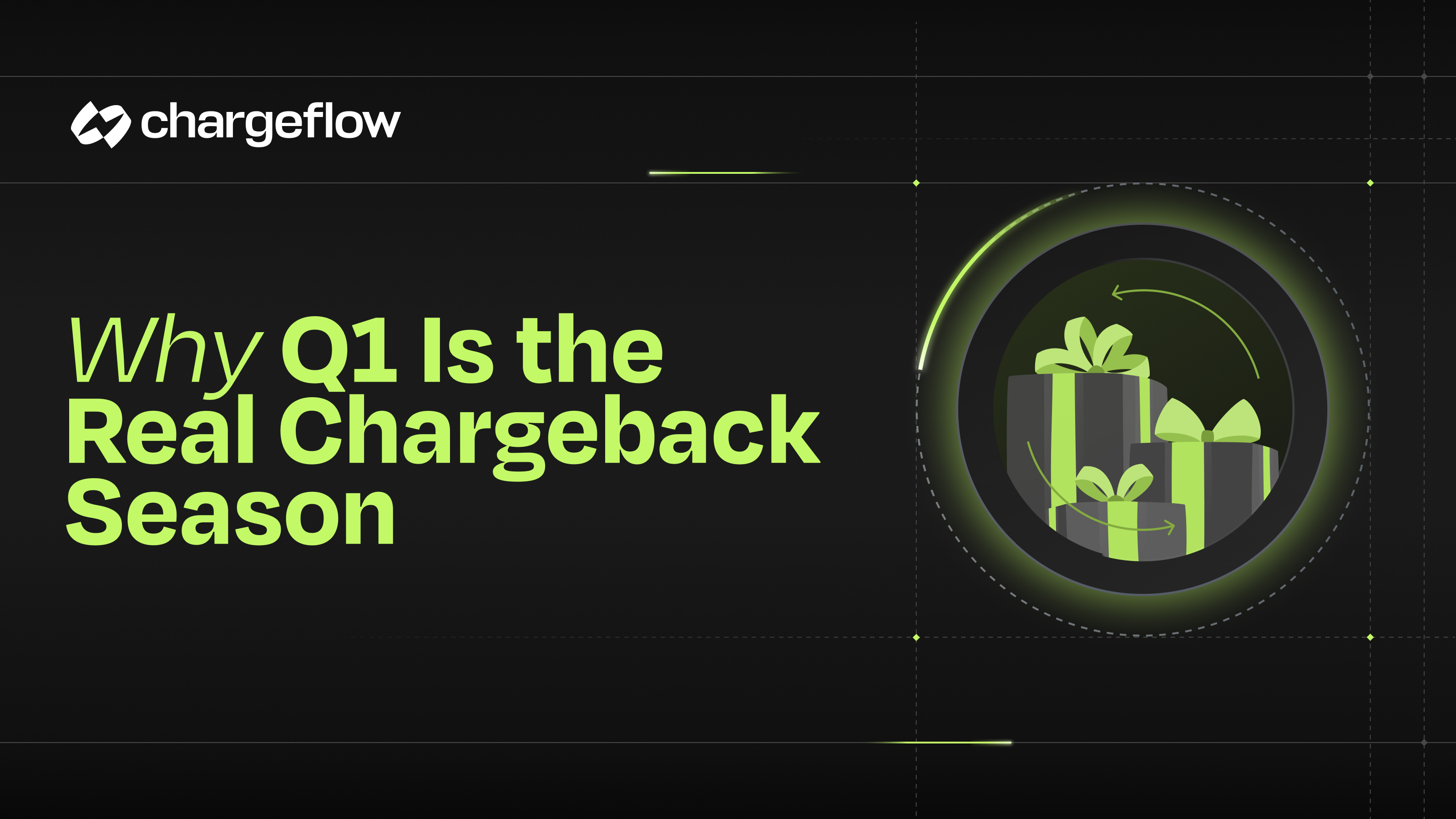How to Win Credit Card Disputes as a Merchant? A Comprehensive Guide for 2023

Chargebacks?
No longer your problem.
Recover 4x more chargebacks and prevent up to 90% of incoming ones, powered by AI and a global network of 15,000 merchants.
Cracking the Code: Empower Your Business with Winning Strategies for Credit Card Disputes. Protect Your Profits and Outsmart the Competition!
Welcome to our comprehensive guide on winning credit card disputes as a merchant. In today's digital age, where online transactions are the norm, credit card disputes have become an integral part of the merchant's journey. As a merchant, understanding the intricacies of the dispute process and knowing how to navigate through it can save you time, money, and reputation.
In this article, we will walk you through everything you need to know about credit card disputes and equip you with effective strategies to increase your chances of winning. Whether you're a small business owner or an e-commerce giant, this guide is designed to help you handle credit card disputes like a pro.
We'll start by delving into the fundamental aspects of credit card disputes. You'll gain a clear understanding of what they are and the key players involved in the process. Knowing the reasons behind disputes will empower you to take proactive measures to prevent them from occurring in the first place.
A significant part of winning credit card disputes lies in the strength of your evidence. We'll emphasize the importance of maintaining detailed transaction records and guide on gathering and organizing relevant evidence. By validating delivery information, leveraging customer communication records, and presenting a compelling case, you'll greatly increase your chances of success.
Additionally, we will explore how to effectively collaborate with your payment processor and acquiring bank. Understanding their roles and leveraging their support can make a significant difference in the outcome of your disputes. We'll also touch on alternative dispute resolution options, such as arbitration and litigation, and when it may be necessary to seek legal counsel.
So, whether you're an experienced merchant looking to fine-tune your dispute resolution skills or a new business owner navigating the complexities of credit card disputes, this guide is here to support you every step of the way. Get ready to master the art of winning credit card disputes and safeguard your business's financial stability and reputation. Let's dive in!
Understanding Credit Card Disputes
Credit card disputes, also known as chargebacks, occur when a cardholder questions a transaction made on their credit card statement. This leads to a reversal of funds from the merchant's account and a refund to the cardholder. Disputes can arise due to various reasons, including unauthorized transactions, non-receipt of goods or services, defective products, or billing errors.
Credit card disputes can be a challenging and frustrating experience for merchants. As a merchant, it is crucial to have a clear understanding of credit card disputes, the parties involved, and the reasons behind them.
Parties Involved in Credit Card Disputes
In a credit card dispute, several parties are involved, each with their roles and responsibilities. These include:
- Merchant: The business or individual who sold the product or service and is subject to the dispute.
- Cardholder: The customer who initiated the dispute by questioning the validity or quality of the transaction.
- Issuing Bank: The bank that issued the credit card to the cardholder. They handle the cardholder's dispute and make the final decision on the outcome.
- Acquiring Bank: The bank that processes the merchant's credit card transactions. They communicate with the issuing bank on behalf of the merchant during the dispute process.
Prevention Strategies to Minimize Disputes
As a merchant, credit card disputes can be one of the most frustrating and time-consuming issues to deal with. Not only do they result in lost revenue, but they can also damage your reputation with customers and financial institutions. However, by implementing effective prevention strategies, you can minimize the risk of disputes and safeguard your business.
1. Building Strong Customer Relationships
One of the most effective ways to prevent disputes is to build strong customer relationships. When you establish a good rapport with your customers, they are more likely to trust you and communicate with you about any issues they may have. This can help you address potential disputes before they escalate into chargebacks or legal action. Here are some ways to build strong customer relationships:
- Provide exceptional customer service: Make sure you're providing top-notch customer service, from answering inquiries promptly to resolving issues quickly and efficiently.
- Communicate clearly: Be transparent and clear in your communications with customers. Make sure they understand your products, services, and policies.
- Show appreciation: Thank customers for their business, offer exclusive discounts or promotions, and follow up after purchases to ensure they are satisfied.
2. Clear and Transparent Policies
Another way to prevent disputes is to have clear and transparent policies in place. This can help prevent misunderstandings and ensure that customers are aware of your terms and conditions. Some important policies to consider include:
- Return and refund policies: Clearly outline your return and refund policies, including any restrictions or conditions.
- Shipping policies: Let customers know how long it will take for their products to arrive, what shipping options are available, and any associated costs.
- Payment policies: Clearly state your accepted payment methods, payment deadlines, and any fees or penalties for late payments.
3. Accurate Product Descriptions and Details
Misleading or inaccurate product descriptions can lead to customer confusion and disappointment, which can in turn lead to disputes. To prevent this, ensure that your product descriptions are clear, accurate, and detailed. Here are some tips:
- Use high-quality images: Provide high-quality images of your products from multiple angles to give customers a clear idea of what they're purchasing.
- Provide detailed descriptions: Include detailed descriptions of your products, including size, weight, dimensions, materials, and any special features or functions.
- Be honest: Don't exaggerate or misrepresent your products. Be honest about their features, limitations, and potential drawbacks.
4. Secure Payment Processing and Fraud Prevention Measures
Fraudulent transactions can result in chargebacks and disputes, which can be costly and time-consuming to resolve. To prevent fraud, ensure that your payment processing system is secure and that you have fraud prevention measures in place. Here are some ways to do this:
- Use a trusted payment gateway: Choose a payment gateway that is trusted and reputable, and that offers strong security measures to protect against fraud.
- Verify transactions: Use fraud detection tools to verify transactions and flag any suspicious activity.
- Train your staff: Ensure that your staff are trained to recognize and prevent fraudulent activity.
By implementing these prevention strategies, you can reduce the risk of disputes and protect your business from costly chargebacks and legal action. Remember, prevention is key – so invest the time and resources necessary to implement effective prevention strategies and safeguard your business.
Responding to Credit Card Disputes
As a merchant, it's essential to be prepared and proactive when it comes to handling credit card disputes. Promptly responding to these disputes and presenting a compelling case can significantly increase your chances of winning.
In this section, we will guide you through the process of effectively responding to credit card disputes and maximizing your chances of success.
1. Review and Understand the Dispute Notification
Upon receiving a credit card dispute notification, take the time to carefully review and understand the details provided. Pay close attention to the reason for the dispute, the transaction information, and any accompanying documentation. Understanding the specific nature of the dispute will help you craft a targeted response.
2. Gather Evidence to Support Your Case
To build a strong defense against the credit card dispute, you need to gather compelling evidence. This may include order forms, shipping receipts, delivery confirmations, and any other relevant documentation that demonstrates the legitimacy of the transaction. Ensure that you have access to detailed records that can back up your claims.
3. Communicate with the Customer
Engaging in open and respectful communication with the customer is crucial in resolving credit card disputes. Reach out to the customer promptly, seeking to understand their concerns and professionally address them. Listen attentively and empathetically, offering solutions or clarifications that can help resolve the dispute amicably.
4. Construct a Persuasive Response Letter
When crafting your response letter, adopt a clear and concise approach. Begin by acknowledging the customer's concerns and providing a summary of the issue.
Next, present your side of the story, including any evidence or relevant policies that support your position. Use polite and professional language throughout, ensuring that your response is both persuasive and well-structured.
5. Include Supporting Documentation and Evidence
Support your response letter with concrete evidence to strengthen your case. Attach copies of relevant documentation such as invoices, receipts, emails, or any other records that substantiate your claims. Clearly label each document and refer to them in your response letter to make it easier for the recipient to understand and evaluate your position.
6. Follow Proper Procedures and Deadlines
Be aware of the specific procedures and deadlines set by the credit card network or your payment processor for responding to disputes. Adhere to these guidelines meticulously to ensure that your response is considered valid and timely. Failing to meet deadlines can significantly weaken your case and reduce your chances of a successful outcome.
7. Maintain Professionalism and Patience
During the dispute resolution process, it's crucial to remain professional and patient. Keep all communication courteous and focused on finding a resolution. Avoid becoming defensive or confrontational, as this can negatively impact the outcome. Remember that maintaining a professional image can help you build credibility and establish trust with the relevant parties.
8. Seek Professional Advice if Needed
In complex or high-stakes credit card disputes, it may be beneficial to seek professional advice from legal experts or dispute resolution specialists. They can provide valuable insights and guidance based on their expertise in the field. Professional assistance can increase your chances of success and help you navigate the intricacies of the dispute resolution process.
Common Types of Disputes and How to Handle Them
As a merchant, it's essential to be prepared for various types of credit card disputes that may arise. By understanding these common dispute categories and knowing how to handle them effectively, you can increase your chances of successfully resolving disputes in your favor. Here, we will explore the most prevalent types of disputes and guide how to handle each situation.
1. Non-receipt of goods or services
If a customer claims they haven't received the ordered goods or services, take the following steps:
- Verify the delivery status using tracking information or proof of delivery.
- Communicate with the customer promptly and professionally to address their concerns.
- Offer a resolution, such as resending the item, providing a refund, or offering store credit, depending on the circumstances.
- Maintain thorough documentation of all interactions and actions taken.
2. Unauthorized transactions
Dealing with unauthorized transactions requires a careful approach to protect your business while ensuring customer satisfaction:
- Gather evidence to demonstrate that the transaction was legitimate, such as IP addresses, shipping information, or signed receipts.
- Contact the customer to verify their identity and inquire about the disputed transaction.
- If necessary, work with your payment processor and acquiring bank to investigate the issue further.
- If the dispute remains unresolved, consider escalating the case through arbitration or legal channels.
3. Defective or misrepresented products
When a customer claims that the product they received is defective or doesn't match the description, follow these steps:
- Request detailed information about the issue from the customer, including photos or videos if possible.
- Assess the validity of the claim by comparing it with your product's specifications or terms of sale.
- Offer a solution that aligns with your return policy, such as a replacement, repair, or refund.
- Communicate your proposed resolution to the customer and maintain open lines of communication to address any further concerns.
4. Double charging or processing errors
Handling double charges or processing errors requires prompt action and clear communication:
- Review your transaction records to verify the occurrence of the error.
- Contact the customer to acknowledge the mistake and reassure them that you are working to resolve the issue.
- Initiate the refund process or work with your payment processor to reverse the duplicate charge.
- Provide the customer with a confirmation of the refund or correction made.
5. Services not as described
If a customer claims that the services they received do not match the promised description, follow these steps:
- Gather any evidence that supports your claim of delivering the promised services.
- Communicate openly with the customer to understand their concerns and expectations.
- Offer an appropriate resolution, such as partial refunds, discounts on future services, or the opportunity to redo the service.
Document all interactions and agreements with the customer to protect your business interests.
Remember, when handling disputes, it's crucial to remain professional, responsive, and empathetic toward the customer. Maintain clear and concise communication, addressing the issue promptly, and providing appropriate resolutions based on your business policies.
By proactively addressing these common types of credit card disputes and following the suggested steps for handling each situation, you can effectively manage disputes and protect your business's reputation and financial interests.
Working with Payment Processors and Acquiring Banks
When it comes to credit card disputes, payment processors and acquiring banks play crucial roles in the resolution process. Understanding how to work effectively with these entities can significantly improve your chances of winning disputes. Here are some important considerations:
- Understanding the role of payment processors and acquiring banks: Payment processors act as intermediaries between your business and the acquiring bank. They handle the authorization and settlement of credit card transactions. Acquiring banks, on the other hand, maintain relationships with merchants and manage the funds from credit card sales.
- Collaborating with your payment processor to gather evidence: Your payment processor can be a valuable resource in gathering evidence to support your case. They may provide transaction records, proof of delivery, or other relevant information that can strengthen your position. Maintain open communication with your payment processor and promptly request any necessary documentation.
- Communicating effectively with your acquiring bank: Establishing a good working relationship with your acquiring bank is essential. Keep them informed about ongoing disputes and provide them with timely updates and responses. Clear and concise communication can help them better understand your side of the dispute and increase the likelihood of a favorable outcome.
- Seeking professional advice if necessary: In complex dispute cases, it may be beneficial to seek guidance from professionals who specialize in credit card dispute resolution. They can provide valuable insights and advice based on their experience and knowledge of the industry. Consider consulting with legal counsel or dispute management experts when needed.
Remember, cooperation and effective communication with your payment processor and acquiring bank can make a significant difference in the outcome of credit card disputes. By building strong relationships and leveraging their support, you increase your chances of successfully resolving disputes in your favor.
Proactive Measures to Improve Your Dispute Resolution Process
To ensure a smoother dispute resolution process and minimize the impact of credit card disputes on your business, implementing proactive measures is essential. By taking the following steps, you can enhance your dispute resolution process and reduce the likelihood of disputes arising in the first place:
Analyze dispute trends and patterns
Regularly review and analyze the types of disputes you encounter. Look for common patterns or recurring issues that can be addressed proactively. Understanding the root causes of disputes will help you implement targeted solutions.
Identify areas for improvement in your business operations
Assess your internal processes and identify any weaknesses or gaps that may contribute to disputes. For example, if you frequently receive disputes related to shipping delays, consider optimizing your logistics or partnering with more reliable shipping providers.
Implement preventive measures
Take proactive steps to minimize disputes. Clear and accurate product descriptions, including specifications, dimensions, and features, can help manage customer expectations and reduce the likelihood of disputes arising from product misrepresentation.
Enhance customer communication
Establish clear lines of communication with your customers and encourage them to reach out to you directly with any concerns or issues. Promptly respond to inquiries and address customer grievances in a timely and professional manner. Transparent and effective communication can often resolve potential disputes before they escalate.
Strengthen fraud prevention measures
Implement robust fraud detection and prevention tools to identify and flag suspicious transactions. Stay updated with the latest security technologies and industry best practices to minimize fraudulent activities, which can lead to disputes.
Train your staff
Provide comprehensive training to your employees on dispute resolution procedures, customer service, and fraud prevention. Equip them with the necessary knowledge and skills to handle disputes effectively, address customer concerns, and follow proper escalation procedures when required.
Continuously monitor and refine your dispute resolution process
Regularly review your dispute resolution process and make adjustments as needed. Stay informed about changes in regulations, industry standards, and best practices related to dispute management. By staying proactive and adapting to evolving requirements, you can maintain an efficient and effective dispute-resolution process.
Implementing these proactive measures will not only improve your ability to handle disputes but also contribute to a better overall customer experience. By minimizing the occurrence of disputes and resolving them efficiently when they do arise, you can build trust and loyalty with your customers, ultimately enhancing your reputation and long-term business success.
Fight Dispute With Chargeflow Advanced Technology
Chargeflow is a fully automated chargeback management solution that can help e-commerce store owners fight chargebacks and protect their revenue. With Chargeflow, you can:
- Automate the chargeback dispute process, saving you time and money.
- Increase your chances of winning chargeback disputes with our AI-powered evidence builder.
- Get peace of mind knowing that your chargeback cases are being handled by experts.
Chargeflow is the perfect solution for e-commerce store owners who want to protect their revenue from chargebacks. Sign up today and start fighting chargebacks like a pro!
Here are some of the benefits of using Chargeflow to manage your chargebacks:
- Increased chargeback win rate: Chargeflow AI-powered evidence builder helps you create a strong case for your chargeback disputes, increasing your chances of winning.
- Reduced chargeback costs: Chargeflow automated process saves you time and money, so you can focus on running your business.
- Improved customer satisfaction: Our team of experts will work with you to resolve chargebacks quickly and efficiently, minimizing the impact on your customers.
If you're an e-commerce store owner, you need Chargeflow to protect your revenue from chargebacks. Sign up today and start fighting chargebacks like a pro!
Don't let chargebacks and disputes eat into your profits. Sign up for Chargeflow today and start fighting back!

Chargebacks?
No longer your problem.
Recover 4x more chargebacks and prevent up to 90% of incoming ones, powered by AI and a global network of 15,000 merchants.
















































.png)








